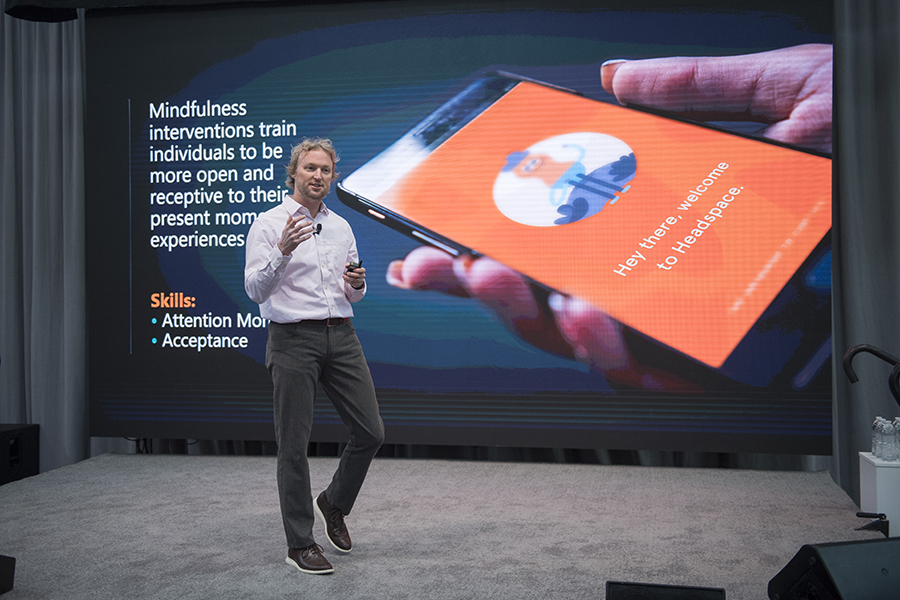
Mindfulness Meditation Matters
Dietrich College Associate Professor David Creswell shares the science behind what makes us resilient in stressful times
By Amanda S.F. Hartle
David Creswell, associate professor of psychology at Dietrich College of Humanities and Social Sciences and principal investigator at CMU’s Health and Human Performance Lab, is a world leader in the emerging science behind what makes people resilient in the midst of stressful and life-altering situations like the COVID-19 pandemic.
We asked him to share some insight into his research, which he will talk about during “The Science and Practice of Mindfulness Meditation During Challenging Times” on April 21 at 1 p.m. ET as part of the CMU Faculty Dialogues program.
Many of us continue to adapt to a new normal — working remotely, overseeing our children’s educations via new online formats, learning to study or do research online, distancing from family and friends. What steps should we be taking to be resilient and thrive right now?
We’ve learned in the past couple of decades that are a variety of evidence-based strategies to manage stress that can be applied in this COVID-19 world that we now live in. But it’s important to go into these strategies with the right mindset. We need to change our expectations of how we live in the quarantine world — to be more gentle and more accepting of this new reality knowing that it comes with a loss of control, uncertainty and financial instability. There are also some concrete evidence-based practices that are helpful:
- Expressive writing – You can use daily writing for 10 to 15 minutes a day to directly engage with your thoughts and feelings about the stress and anxiety you’re feeling right now. It provides time and space to discover new meaning about your experience in ways that can help you cope with the ongoing situation.
- Meditation practices – There are lots of smartphone-based meditation apps that offer training and practices you can plug in to at home. Meditation offers a way to find relaxation and to boost your ability to be more open and less reactive to the challenges we face right now.
- Rewarding and supportive activities – Regularly engaging in enjoyable activities, finding ways to connect with others, practicing good sleep and physical exercise habits, all have been shown to foster resilience. I’m sure folks reading this already have heard this before, but it’s easy to let these things slide in a quarantined and unpredictable world.
How do these stress management strategies you mention affect our responses to stress?
These strategies and interventions change the brain and how the brain processes stressful experiences. Research in my lab shows that they engage the brain’s prefrontal cortex which is an area that is really important for planning and emotion regulation. They also have ways of turning down the brain’s alarm system, including regions such as the amygdala, which drive the fight or flight stress response. In short, these strategies (e.g., meditation) train your brain to foster a more effective stress response.
What is an easy mindfulness routine that we can add to our daily lives?
If you’ve never done mindfulness meditation before, I recommend downloading an app and doing some guided practices that are already available. At CMU, we have access to Headspace, but there are others such as Calm or Brightmind. The practices can range from a couple of minutes to 20 minutes long, so they’re a great way to test out meditation in the comfort of your home. In all cases, these meditation activities train your attention to be open and receptive to your experience, making you less reactive.
A lot of people expect to get blissed out, but this is exercise for the brain. Your mind wanders, you have to bring it back and stay focused. It’s hard work. But these really are desirable difficulties to work through, so that when you’re done mediating, you can take these strategies you have practiced into better managing the adversity you are facing in your life.
In a nutshell, what can attendees expect to gain from your webinar?
We’re going to spend time doing guided mindfulness meditation practice, and then I’ll discuss the science about how mindfulness meditation works, and what it can do for stress resilience and health. I’ll detail the skills you’re building with during mindfulness meditation practice and how that translates into more resilience in this current pandemic.